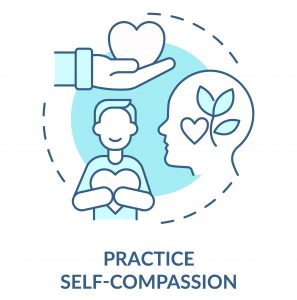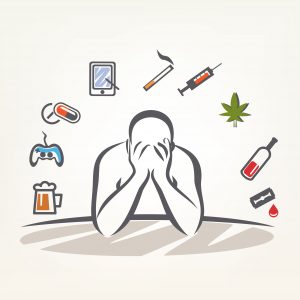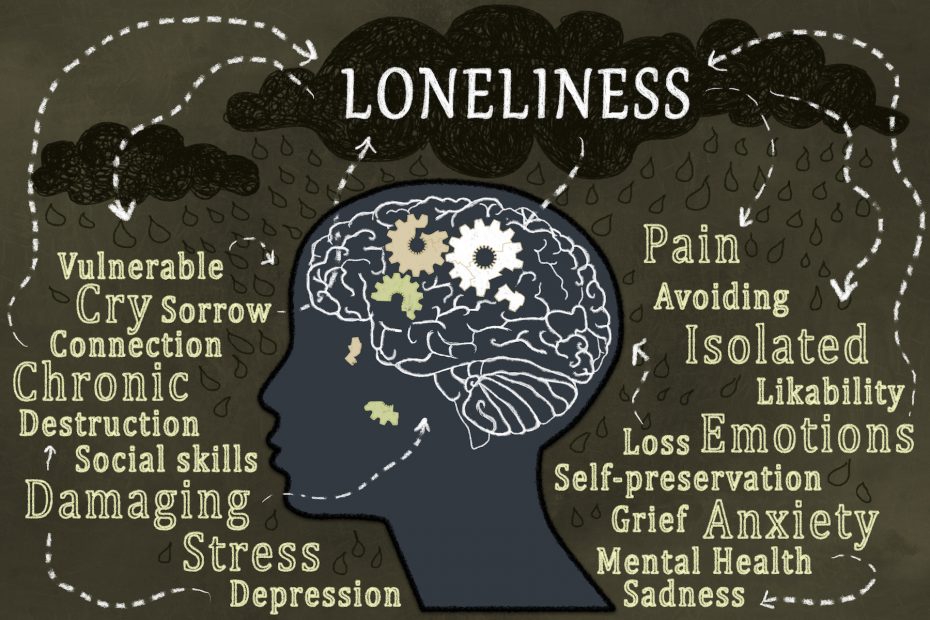Whilst the Covid-19 pandemic continues to bring challenges to our personal and social health, there is a hidden epidemic that is a harmful to men’s health as heart disease. Loneliness: a taboo subject but one that we need to address urgently. In this blog, Paul explores the individual and social factors beneath loneliness.
Covid, Christmas and isolation
The Covid-19 pandemic has presented us with many huge and unique challenges to our wellbeing. I believe we are yet to feel the full impact of many of these challenges – the isolation and disconnection that many of us have endured are likely to manifest in a tsunami of mental and emotional health issues for years to come.
Loneliness is a huge issue for men individually and society as a whole. Like many men, I have spent too much time alone over the past two years. Zoom can be a wonderful tool but it is a poor substitute for the precious, in-person social connection we may have previously taken for granted.

As we approach our second Covid-Christmas, our thoughts may turn to joyful festivities and family connection. However, Christmas can be a lonely time of year for many people. The imminent possibility of further pandemic-related restrictions are likely to only intensify those feelings of isolation.
At times, many of us act in ways that intensify our loneliness rather than banishing it. We may turn to coping mechanisms that numb or distract us from the pain of loneliness: alcohol, Netflix binges, over-exercising, online shopping, pornography or any number of other maladaptive behaviours – all in a vain attempt to fill a hole that no substance or solitary activity could ever fill.
What is beneath this epidemic of loneliness and how can we combat it?
Social stigma and male vulnerability
The pandemic is not the only factor contributing to the chronic loneliness that I and other men feel. There are also social and personal elements to this epidemic of loneliness. The widely acceptable forms of male connection seem to be through shared ‘masculine’ experiences such as following sport together or ‘banter’ with mates in the pub. Those of us who wish to bond in ways that are less focused on tribalism, testosterone and alcohol may feel cast adrift.
 Personally, I seek deep, gentle, mindful and authentic connection. I find this gift blooms in the rare settings that positively encourage vulnerability and intimacy. Sharing our hopes, fears, joys, demons, daemons and insecurities – the softer depths and harder shadows that all humans experience but rarely share. I crave these settings, finding great value in relationships based on expansive honesty, love, curiosity and openness.
Personally, I seek deep, gentle, mindful and authentic connection. I find this gift blooms in the rare settings that positively encourage vulnerability and intimacy. Sharing our hopes, fears, joys, demons, daemons and insecurities – the softer depths and harder shadows that all humans experience but rarely share. I crave these settings, finding great value in relationships based on expansive honesty, love, curiosity and openness.
Why do we hide so much of ourselves? Why do so many workplaces, social and family settings seem to deem vulnerability and authenticity as inappropriate for daily consumption? The closest that many men get to this may be drunkenly proclaiming their love for their “best mate” after a night on the tiles. 
It can be hard to admit we are lonely; it takes courage to expose our wounds. When we do so, we may worry how the other party will respond. We risk judgement, alienation and may fear making others uncomfortable. On many occasions, I have witnessed people courageously baring their soul, only for the listener to respond by nervously clearing their throat, staring at the carpet and then shuffling off to find someone to talk to about less ‘heavy’ things.
Many men may feel ashamed of their vulnerability and loneliness. We may feel that our aloneness reflects a flaw in ourselves. Our shame stems from the messages that us men have received from our caregivers, teachers, colleagues, the media and more. The societal stigma runs deep. Us men must be ‘strong’, silently carrying our burdens alone and locking away many of our true thoughts and feelings in an inner room marked ‘Danger – no entry.’
Anger: the ‘acceptable’ face of male vulnerability
From an early age, we are told that ‘big boys don’t cry’. We are scolded for being ‘soft’ when we express our vulnerability through sadness or distress. We are taught that emotions are for girls…apart from anger.
 I have learned that there is usually another emotion beneath anger, and it is usually fear. Anger is the ‘socially acceptable’ way that many males mask their vulnerability. We do not want to appear ‘weak’ so we go on the attack.
I have learned that there is usually another emotion beneath anger, and it is usually fear. Anger is the ‘socially acceptable’ way that many males mask their vulnerability. We do not want to appear ‘weak’ so we go on the attack.
Anger does serve a useful purpose – it signals that a boundary has been crossed or one of our needs has not been met. It is useful to promote positive action but it is never transformative. We may turn our anger outwards towards others or the world in general – this aggressive response tends to be destructive and divisive, ultimately leaving us feeling more alone.
Alternatively, we may turn our anger inwards, punishing ourselves for making ‘mistakes’ or not being ‘good enough’. This may take the form of negative self-talk and/or behaviours that sabotage our wellbeing – all of these are effectively acts of self-harm…
The 3 ways men tend to respond to loneliness
Loneliness is painful, so our understandable response may be to cover it up. Typically, we respond in one of the following three ways:
- We may attempt to repress our feelings, denying that we are feeling isolated and pushing this loneliness into our unconscious. One way I have attempted to numb my feelings over the past year has been through using alcohol – a very common coping mechanism for western men. Using this socially-acceptable drug can lead to significant issues with our physical, mental, emotional and spiritual health, with the spectre of an additive, negative spiral always a threat. Numbing and repressing our feelings might work in the short term but cannot solve the underlying issues. If we do not deal with our emotions they will express themselves in some other way. Depressing emotions such as loneliness tends to lead to depression and, sadly all too frequently for western men, suicide.

- We may hide our vulnerability by withdrawing. When we feel a lack of genuine connection with others, we may feel ashamed of ourselves, believing we are ‘not good enough.’ When we feel this ‘toxic shame’, we may opt to isolate ourselves for an unhealthy amount of time, thus minimising the chance of being exposed and judged by ourselves or others. However, we are social creatures and, as the pandemic has shown, we need face-to-face contact, we need love and connection. When we are starved of this, depression and anxiety very often develop, exacerbating the problem we were trying to avoid in the first place.
- We may fall into obsessive behaviours as a substitute for meaningful human connection. This can take the form of various unhelpful behaviours in an attempt to distract ourselves from our pain. These include over-working and over-consuming food, alcohol and media.
Tackling loneliness in healthier ways
When we (consciously or unconsciously) choose to cover up our aloneness in one of the above ways, we are losing contact with our vulnerability. We are distancing ourselves from a core need, a core aspect of being human and a core element of our soul nature. In attempting to push away our pain we are causing ourselves more pain.
How can we tackle loneliness in a healthier way? Tara Brach is one of my favourite teachers. She taps into the ancient wisdom of Buddhism and melds it with modern psychology, blending her deep understanding of trauma and relationships with an approach centred upon mindfulness and compassion. Her advice to tackle loneliness? Stay with it.
This may seem counter-intuitive, because staying with unpleasant feelings is…well, unpleasant. And, yes, sitting with the feeling of loneliness does hurt at first, but it is the way back to connection with oneself and others.
 Tara says that loneliness arises from early attachment issues and/or trauma. She suggests that we approach loneliness like you would approach a frightened child – with mindfulness and compassion – using the RAIN technique set out below.
Tara says that loneliness arises from early attachment issues and/or trauma. She suggests that we approach loneliness like you would approach a frightened child – with mindfulness and compassion – using the RAIN technique set out below.
- Recognise it as loneliness – name it.
- Allow it to be there – it belongs. Feel the pain and let it run deep.
- Investigate where the feeling is in your body. Connect to the sensation and focus on it.
- Nurture your needs, bringing kind self-compassion to love yourself into healing.
Although this approach may sound like an individual undertaking, the fourth step involves taking action with others. We cannot thrive without sensing our belonging to our community(s), ourselves and also our higher self/soul/spirit/God/The Universe or whatever you want to call it. As Tara says, we are wired for connection – it’s our most profound need, which is embedded in our DNA.
Journeying out of loneliness
Many people assume that, given the work I do and the work I have done on myself, I have it all together. Not so! Like everyone else, I have wounds, fears, insecurities and have experienced periods of loneliness.
 In my roles as a Mental Health First Aid instructor, psychotherapist and in my personal life, I strongly advocate for acknowledging and expressing our feelings, however uncomfortable they may be. Ongoing inner work – including personal psychotherapy and spiritual practices such as meditation, mindfulness, journaling, acceptance and self-compassion – has been hugely beneficial for me.
In my roles as a Mental Health First Aid instructor, psychotherapist and in my personal life, I strongly advocate for acknowledging and expressing our feelings, however uncomfortable they may be. Ongoing inner work – including personal psychotherapy and spiritual practices such as meditation, mindfulness, journaling, acceptance and self-compassion – has been hugely beneficial for me.
But inner work alone is not enough. To overcome loneliness we need to act differently out in the world. We need to continually push ourselves to step out of the comfort zone and show our vulnerability, whilst the scared part of us may be screaming, “Stay in, safe safe!” We can build self-esteem, purpose, connection, confidence and authenticity through connecting with others in a meaningful way. Personally, I chose to found or join various peer support groups, including Pathlight Thrive Hive and Mental Health Football (pictured) in order to  connect with myself and my needs in the company of others.
connect with myself and my needs in the company of others.
In short, we need to show up, take the risk to show ourselves and our vulnerability. Although doing so may sometimes feel scary, showing up ultimately feels really good. Sometimes this ‘reaching out and letting in’ leads to wonderful, loving connections. Sometimes those connections end, which can be really painful.
But pain is the flip side of love – you can’t have one without the other; and the stronger the love, the more intense the pain. For me, investing in vulnerability is worth the risk of pain because, just like you, I need connection…and love is more powerful than fear.
The journey out of loneliness can be a long road – a constant commitment to showing up. I am thankful for my own experiences of loneliness. I have learnt a lot about myself and what it is to be human…and all of this enhances the empathetic support I can offer to clients, friends and family members who may be experiencing similar challenges.
My hopes
 In writing this blog, I have two hopes. Firstly, I hope this will help to raise awareness of and normalise male loneliness – a topic that, understandably, is shrouded in taboo, embarrassment and shame. Secondly, I hope others may be inspired to connect with their own experiences and take steps towards positive change.
In writing this blog, I have two hopes. Firstly, I hope this will help to raise awareness of and normalise male loneliness – a topic that, understandably, is shrouded in taboo, embarrassment and shame. Secondly, I hope others may be inspired to connect with their own experiences and take steps towards positive change.
As the article below states, male loneliness is an epidemic, which is as harmful to our health as heart disease. Change happens when we are ready, willing and able to embrace it. If you are feeling lonely, may you find the strength within yourself to reach out, let others in, connect with what is important to you and thus transform your reality.
Further information and support
If you feel I can support you on your journey via personal psychotherapy or in other ways, please get in touch:
Read more:
- https://www.psychologytoday.com/us/blog/fear-intimacy/202111/the-high-cost-mens-loneliness
- https://www.tarabrach.com/sheltering-in-love-part-5/
For anyone who may feel lonely this Christmas Day, this event in Greater Manchester could be of interest:
For support with loneliness:
For information on how Pathlight can support you, your family or your organisation around mental health, relationships, workplace wellbeing and more, please get in touch:
- Click here to sign up to Pathlight’s e-newsletter for occasional updates on our services, resources to support mental health & wellbeing and more.
- Visit our website or email us for details of our services
- Mental Health First Aid training
- Workplace wellbeing programmes
- Coaching for individuals, families and teams
- Webinars for individuals and organisations



For more information on this blog post, interviews or services provided by Pathlight Ltd, please email Paul: info@pathlight.org.uk


